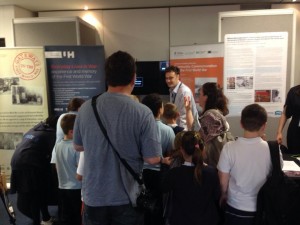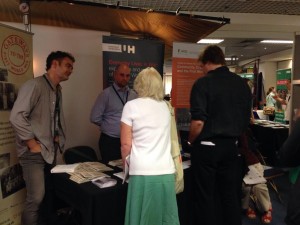The AHRC’s Connected Communities Festival held in Cardiff at the start of July provided a welcome opportunity for members of all five of the AHRC’s First World War engagement centres to get together and talk about our various projects, both with each other, and with members of the public. Helen Brooks was there representing the Gateways Centre and over two days, at the Motorpoint in the heart of Cardiff, had the opportunity to talk about the First World War with a diversity of people, as well as to have stimulating discussions with people from other AHRC-funded projects.
As part of the event, the centres were asked to put together a collaborative workshop which, it was decided, would focus on two key themes which overlap all the centres: cultures of commemoration; and theatre about, and during, the war. The workshop was well attended, despite the difficulties in transport, and finding the room we were in! And audiences had a chance to hear about a range of work taking place across the centres. Ian Grosvenor, from Voices of War and Peace, screened a video reflecting on work undertaken with local schools, whilst Jonathan Coope and Paul Elliott from the Centre for Hidden Histories shared some of their findings of their Green Spaces project which looked at parks in Nottingham during the war. In the section on ‘Performing the First World War’ Andrew Maunder, from Everyday Lives in War, talked about a recent staging of J.M. Barrie’s A Well Remembered Voice at Hertfordshire, raising questions about how drama can shed light on people’s experiences and attitudes during the war. In an interesting contrast, focusing on new drama created from local First World War material, Brenda Winter-Palmer from Living Legacies 1914-1918 discussed the process involved in making her recent play The Medal in the Drawer, and it’s connection to her own experience of researching her grandfather’s role in the Great War. Highlighting the importance of theatre in upcoming commemorative projects, Dr Winter-Palmer pointed to drama’s unique ability to allow divergent opinions and perspectives to be voiced simultaneously, a theme which Gateways will be developing further in our upcoming collaborative events with the Marlowe Theatre, Canterbury.
Covering a diversity of projects, the workshop provided a welcome opportunity to discuss how the centres can engage with the complex and contested legacies of the war when working with local communities. A key theme which arose was the importance of questioning myths of the war, and allowing for a range of historic experiences and attitudes to be reflected in commemorative activities. Some excellent questions from audience members provided stimulating discussion around these topics, making for a very engaging event.


